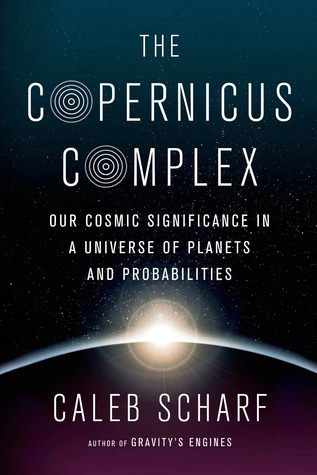
The Copernicus Complex
Our Cosmic Significance in a Universe of Planets and Probabilities
کتاب های مرتبط
- اطلاعات
- نقد و بررسی
- دیدگاه کاربران
نقد و بررسی

June 16, 2014
Humans, says astrophysicist Scharf (Gravity’s Engines), are torn between two philosophical extremes: either we—ourselves and our planet—are unique and rare or we are simply “as dull as they come,” our existence nothing special at all in a universe dripping with exo-planets and stars. Both points of view influence the way we search for intelligent life in the universe. Scharf says the trouble began with Copernicus’s heliocentric system and was strengthened by Newton’s theory of gravity and Einstein’s relativity—they all reinforced the idea of a homogenous universe with other stars and solar systems much like our own. But more recently proponents of the “anthropic principle” itemized the scientific “coincidences” needed for intelligent life to evolve, and, suddenly, humanity began to sound special again. Scharf recommends looking for “Earth-equivalent”—rather than “Earth-like”—worlds with the most basic features required to support life. Humans also need to understand that each world can, and probably will, change radically over time. Scharf covers a lot of ground, and his entertaining, accessible approach offers valuable insight not just into science, but also into the way our assumptions can make a difficult task, like finding life in the universe, even harder. Agent: Deirdre Mullane, Mullane Literary Assoc.

August 15, 2014
The universe is massive, and humans occupy an infinitesimal part. Do we matter? In this ingenious mixture of cosmology, evolutionary biology and philosophy, Columbia Astrobiology Center director Scharf (Gravity's Engines: How Bubble-Blowing Black Holes Rule Galaxies, Stars, and Life in the Cosmos, 2012) gives a thumbs up. Throughout history, all cultures believed that the Earth occupied the center of the universe. By the 17th century, scientists knew that it didn't. Named in honor of the Polish astronomer who placed the sun at the heart of the solar system, the Copernican Cosmological Principle states that we do not occupy a privileged place; the Earth is just an ordinary planet orbiting an undistinguished star in a vast cosmos. Yet 20th-century observers have begun to notice that the universe seems fine-tuned in our favor. If a few constants-the strength of gravity in relation to electromagnetism, the percent of matter converted to energy in stars-were slightly different, stars would not have been able to form in the early universe, so life would never have developed. If our planet is ordinary, the universe should be full of them. This turns out to be true, with probably 20 billion in our galaxy. Sadly, these vary widely in size and composition and move in wildly irregular orbits; our well-behaved, symmetrical solar system is unusual. On the plus side, primitive organisms appeared quickly as our planet cooled. Earth's carbon chemistry is ubiquitous throughout the cosmos, so the starter mix for life seems easy to come by. Most readers will agree with Scharf's complex but astute arguments that "[w]hile we cannot be at the center of what we now know to be a centerless universe, we nonetheless occupy a very interesting place in it-in time, space, and scale."
COPYRIGHT(2014) Kirkus Reviews, ALL RIGHTS RESERVED.

























دیدگاه کاربران